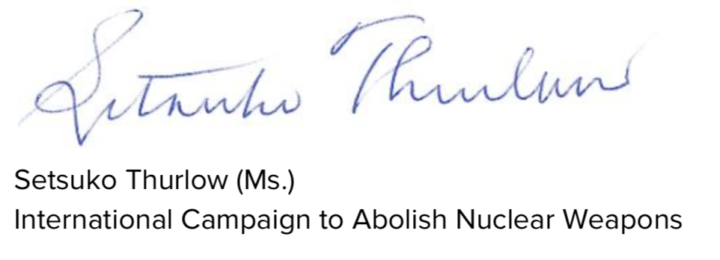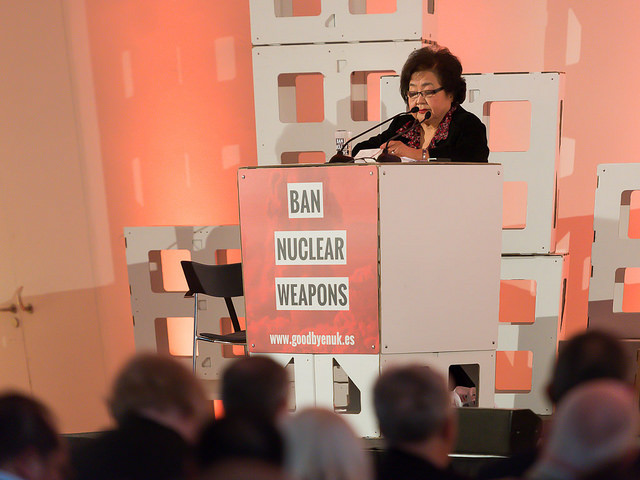His Excellency Mr. Pedro Sánchez
President of the Government
Kingdom of Spain
Your Excellency,
This August will mark 75 years since the atomic bombings of Hiroshima and Nagasaki. I am writing to you as an atomic bomb survivor of Hiroshima and an active member of the International Campaign to Abolish Nuclear Weapons (ICAN), 2017 Nobel Peace Laureate. Atomic bomb survivors are urging all world leaders to reflect on the catastrophic harm that nuclear weapons inflict and to commit to eliminate them as a matter of urgency.
As a 13-year-old schoolgirl, I witnessed my city of Hiroshima blinded by the flash, flattened by the hurricane-like blast, incinerated in the heat of 4,000 degrees Celsius, and contaminated by the radiation of one atomic bomb. A bright summer morning turned to dark twilight with smoke and dust rising in the mushroom cloud, dead and injured covering the ground, begging desperately for water and receiving no medical care at all. The spreading firestorm and the foul stench of burnt flesh filled the air.
Miraculously, I was rescued from the rubble of a collapsed building, about 1.8 kilometres from ground zero. Most of my classmates in the same room were burned to death alive. I can still hear their voices calling their mothers and God for help. As I escaped with two other surviving girls, we saw a procession of ghostly figures slowly shuffling from the centre of the city. Grotesquely wounded people, whose clothes were tattered, or who were made naked by the blast. They were bleeding, burnt, blackened and swollen. Parts of their bodies were missing, flesh and skin hanging from their bones, some with their eyeballs hanging in their hands, and some with their stomachs burst open, with their intestines hanging out.
In the weeks, months and years that followed, many thousands more would die, often in random and mysterious ways, from the delayed effects of radiation. Still to this day, radiation is killing survivors. Every person who died had a name. Every person was loved by someone.
In our struggle for survival, rebuilding lives out of the ashes, we survivors, or ‘hibakusha’, became convinced that no human being should ever have to repeat our experience of the inhumane, immoral, and cruel atomic bombing, and that our mission is to warn the world about the reality of nuclear dangers and to help people understand the ultimate evil of nuclear weapons. We have a moral imperative to abolish nuclear arsenals, before they are used again, by accident or by design. With this conviction we have been speaking out around the world for the past seven decades for the total abolition of nuclear weapons.
Most recently, it is ICAN that has brought hope to the world. As you would recall, 122 states voted to adopt the Treaty on the Prohibition of Nuclear Weapons at the United Nations on
7 July 2017. For me and so many other survivors of the atomic bombings, this was a moment of great joy and renewed optimism. It marked the beginning of the end of the most horrific weapons ever used in war or tested on earth and underwater. When I travelled to Oslo later that year for a ceremony to jointly accept the Nobel Peace Prize awarded to ICAN for our work to bring this important treaty into being, I commented that all responsible, right-minded leaders will sign and ratify the treaty, and history will judge harshly those who do not. I am pleased to note that the treaty is now three-quarters of the way to attaining the 50 ratifications needed for entry into force.
Prime Minister Sánchez, in February of this year, I travelled to Spain with my colleagues from ICAN to further our work for nuclear abolition. I was immensely impressed by the hundreds of Spanish citizens I met who support global nuclear disarmament – including the Mayor of Barcelona, Ms. Ada Colau, who signed the ICAN Cities Appeal during our visit. I was likewise impressed to meet your colleagues in government who are advocating for nuclear disarmament, several of whom I met personally on 26 February when I spoke at the Spanish Congress. It is certainly remarkable to me to understand how many Spanish citizens and government representatives are committed to eliminating nuclear weapons.
My visit to Barcelona and Madrid occurred just before the great capitals of Europe began shutting down. By now hundreds of thousands of people have died from the coronavirus pandemic across the globe. Even in this unprecedented time of crisis, nuclear-armed states continue to hold the world hostage under the threat of nuclear annihilation while squandering billions of dollars instead of meeting human needs. Although Spain is a NATO member, it is noteworthy that two years ago you committed to signing the Treaty on the Prohibition of Nuclear Weapons during a budget negotiation with the Podemos party leader Mr. Pablo Iglesias. Spain’s promised signature will result in profound forward motion for this treaty among NATO states – heralding a future for NATO without nuclear weapons.
My colleagues in ICAN have determined that there are no legal impediments for NATO states to join the TPNW. Thus, I hope that Spain will soon take the necessary steps to sign and ratify this treaty. This would be consistent with your country’s long-stated support for nuclear disarmament. It is my firm belief and recent experience that the majority of Spanish citizens want a world without nuclear weapons. The treaty embodies the commitment of the international community to ensure that no other cities ever suffer the same fate as mine. I urge you to honour the victims and survivors of the atomic bombings of Hiroshima and Nagasaki, as well as all who have been affected by nuclear testing, particularly indigenous people across the world, by taking action to become a state party without delay.
Please accept, Your Excellency, the assurance of my highest consideration.










